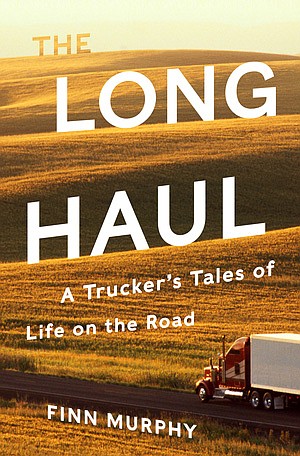No matter how spiffy our facade, some people see us in crisis, at our worst: our doctor, our lawyer, our psychologist and, as Finn Murphy details in his entertaining memoir "The Long Haul," our movers.
"Shippers are frequently not at their best on moving day," he writes, describing the folks whose worldly goods he packs up and schleps across the country in a Freightliner. "Shippers can be testy, upset, suspicious, downright hostile, and occasionally pleasant and relaxed."
Suspicious and downright hostile, like the executive and his wife who filmed Murphy and his crew each time they picked up an object; pleasant and relaxed, like the amiable Bangladeshi doctor who served Murphy coffee as the mover began to realize why this fellow was so happy to be moving to a Mormon community famous for plural marriage.
"The Long Haul" can be read and enjoyed as an adventure story and as a peek into an occupation whose practitioners we see rolling down the highway. Murphy opens with an account of driving 35 tons of tractor-trailer down a steep Rocky Mountain grade "in a miasma of fog and wind and snow." Enduring CB radio insults from other truckers who think he's going too slow, Murphy flips through a mental checklist of the ways this descent could end badly. "The blood soaking into the pavement could be mine at any minute."
In his final chapter, "The Great White Mover," Murphy recalls the feisty, dying widow who sent him barreling across the country with a full load of broken Native American artifacts against a severe, unexplained deadline and, the mover discovers, a remarkable payoff at the end. If "The Long Haul" is ever turned into a cable TV series, this will be one of its signature episodes.
As a white man who finished three years of college before turning to trucking, he's an anomaly in his world and aware of it: "Working people are suspicious of my diction and demeanor, and white-collar people wonder what a guy like me, who looks and sounds like them, is doing driving a truck and moving furniture for a living." Beyond early anecdotes about love of both the road and his independence, Murphy doesn't really explain why. He also doesn't discuss the years he stopped driving. (In a Trucks.com interview, he noted that he was involved in other businesses.)
However, Murphy is a pointed social critic. Bedbugging (trucker slang for movers) gives him a diagonal view of American life. Murphy scoffs at misty notions of truckers as 18-wheel cowboys: "I do not for a moment think I'm a symbol of some bygone ideal of Wild West American freedom or any other half-mythic, half-menacing nugget of folk nonsense."
He also declares that "every driver I've ever encountered listens to public radio," though that is more a comment on public radio's coverage area than truckers' cultural leanings.
He sees the way some shippers dehumanize service workers, particularly the Hispanic men he hires as helpers, as proof of their insecurity. "Your standard-issue Mexican or Brazilian is a hardworking Christian who shares a Western historical experience, speaks a Romance language, uses the same alphabet and numbering system, and has similar aspirations."
Books matter to Murphy: He calls attention to a clerk in a Vermont general store reading Thomas Mann's "Buddenbrooks." (That Murphy even knows of "Buddenbrooks" makes him a literary one-percenter.) Sadly, this man who moves the families of high-end executives sees that "books are completely disappearing." Forget the book-burning firemen of "Fahrenheit 451": "The interactive electronics took care of it without the violence."
Speaking of the Green Mountain State, Murphy offers this bon mot: "It's odd how Vermont's topography and geography are so pleasant and it's such a nice climate, but practically no one lives here. Florida, which has a depressive climate and no topography, has people flocking there."
Most significantly, Murphy's experience packing and hauling tons of stuff hundreds of miles to new homes has made him a believer in non-attachment. Movers rarely become collectors of anything, he points out. "What my customers need to know is that it's not the stuff but the connection with people and family and friends that matter."

